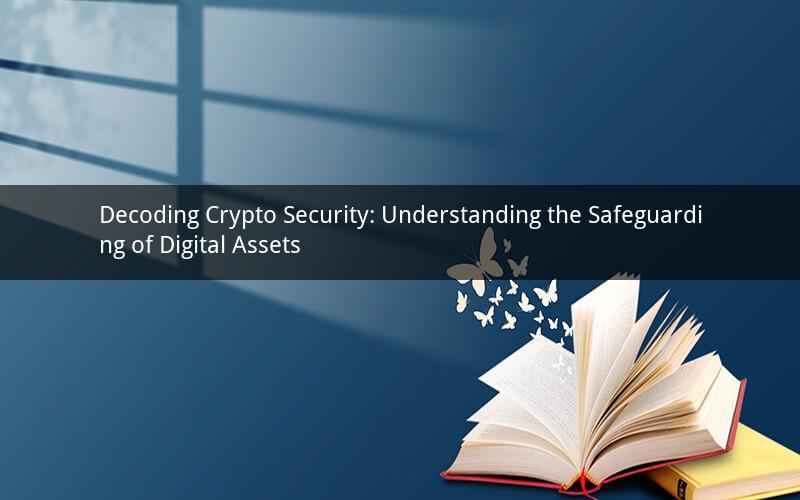
In the rapidly evolving world of cryptocurrencies, the term "crypto security" has become a buzzword for both investors and enthusiasts. But what exactly does it mean? This article delves into the concept of crypto security, exploring its various aspects and highlighting the importance of safeguarding digital assets.
1. What is Crypto Security?
Crypto security refers to the measures and practices implemented to protect digital assets, such as cryptocurrencies, from unauthorized access, theft, and loss. It encompasses a wide range of strategies, tools, and technologies designed to ensure the integrity, confidentiality, and availability of digital currencies.
2. Types of Crypto Security Threats
Understanding the types of threats that cryptocurrencies face is crucial in developing effective security measures. Here are some common crypto security threats:
a. Phishing: This involves tricking individuals into revealing their private keys or other sensitive information by impersonating legitimate entities.
b. Malware: Malicious software, such as viruses, worms, and trojans, can be used to steal private keys, monitor transactions, and compromise the security of crypto wallets.
c. Hackers: Skilled individuals or groups with malicious intent may attempt to gain unauthorized access to crypto wallets, exchanges, or other crypto-related platforms.
d. Social Engineering: This involves manipulating individuals into revealing their private keys or other sensitive information through deception and psychological manipulation.
3. Best Practices for Crypto Security
To ensure the safety of your digital assets, it is essential to follow best practices for crypto security. Here are some key recommendations:
a. Use Strong Passwords: Create strong, unique passwords for your crypto wallets and other online accounts. Avoid using easily guessable passwords, such as birthdays or common words.
b. Enable Two-Factor Authentication (2FA): 2FA adds an extra layer of security by requiring a second form of verification, such as a code sent to your phone, in addition to your password.
c. Keep Private Keys Secure: Private keys are the digital equivalent of a bank's vault key. Ensure that you keep them safe and never share them with anyone.
d. Use Hardware Wallets: Hardware wallets are physical devices designed to store private keys offline, making them more secure against online threats.
e. Stay Informed: Keep up-to-date with the latest crypto security news and trends to stay ahead of potential threats.
4. Crypto Security Tools and Technologies
Several tools and technologies have been developed to enhance crypto security. Here are some notable examples:
a. Multi-Signature Wallets: These wallets require multiple private keys to authorize a transaction, making it more difficult for hackers to steal funds.
b. Cold Storage: Cold storage refers to the practice of storing cryptocurrencies offline, away from the internet. This method reduces the risk of online attacks.
c. Blockchain Technology: The underlying technology behind cryptocurrencies, blockchain, provides a secure and transparent ledger of transactions, making it difficult for hackers to alter the data.
d. Crypto Security Software: Various software solutions, such as antivirus programs and anti-malware tools, can help protect your devices from crypto-related threats.
5. The Future of Crypto Security
As cryptocurrencies continue to gain popularity, the importance of crypto security will only increase. The future of crypto security may involve the following developments:
a. Quantum Computing: Quantum computing has the potential to break traditional encryption methods, so new, quantum-resistant encryption algorithms are being developed to protect digital assets.
b. Decentralized Finance (DeFi): DeFi platforms aim to provide financial services without intermediaries, which could lead to new security challenges and solutions.
c. Smart Contracts: As the use of smart contracts grows, ensuring their security will become a crucial aspect of crypto security.
In conclusion, crypto security is a vital concern for anyone involved in the cryptocurrency space. By understanding the concept, recognizing potential threats, and implementing best practices, individuals and organizations can safeguard their digital assets and contribute to the growth of the crypto ecosystem.
Questions and Answers:
1. Q: Can I use the same password for my crypto wallet and other online accounts?
A: No, it is crucial to use strong, unique passwords for each account to minimize the risk of unauthorized access.
2. Q: Are hardware wallets more secure than software wallets?
A: Yes, hardware wallets are generally considered more secure than software wallets because they store private keys offline, away from the internet.
3. Q: Can I recover my cryptocurrency if I lose my private key?
A: No, losing your private key means losing access to your cryptocurrency. It is essential to keep your private keys safe and secure.
4. Q: Is crypto security a concern for only large investors?
A: No, crypto security is a concern for everyone involved in the cryptocurrency space, regardless of their investment size. Even small investors can become targets for cybercriminals.
5. Q: How can I stay informed about the latest crypto security threats?
A: Follow reputable crypto news websites, join crypto forums, and attend industry conferences to stay updated on the latest developments in crypto security.